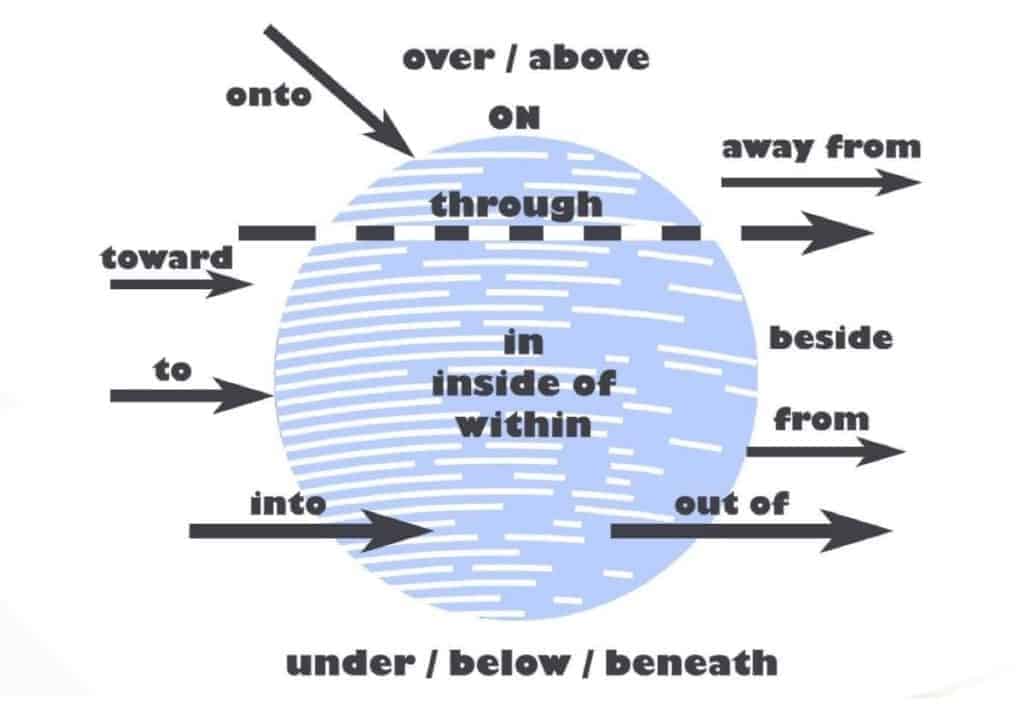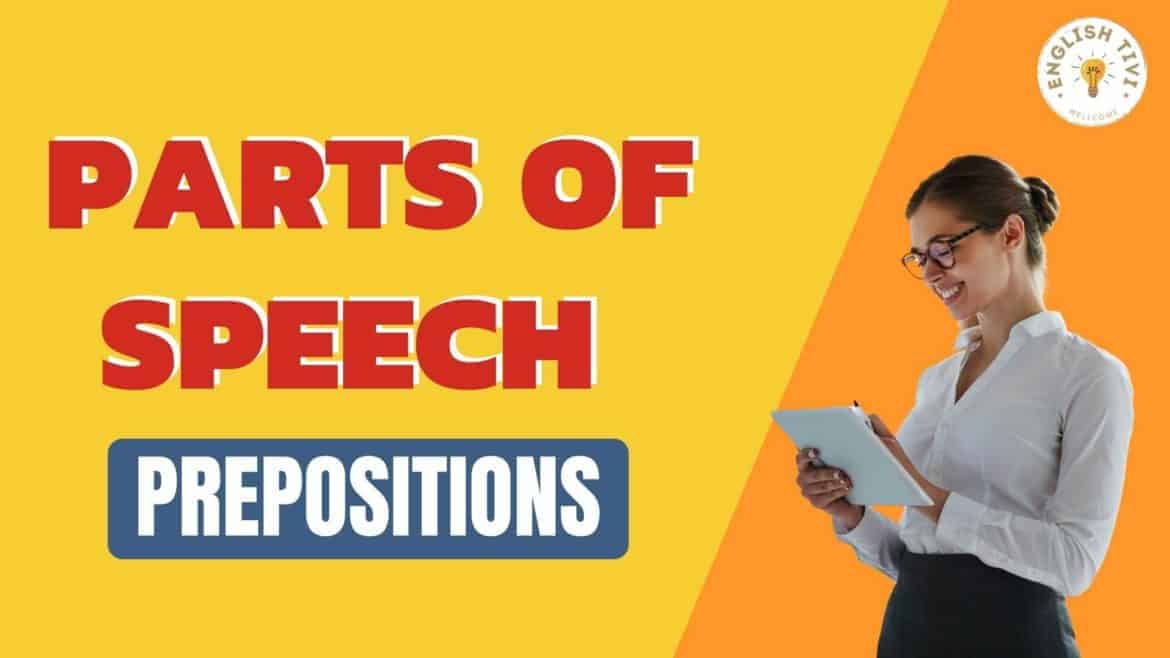Prepositions in English appear in most English sentences, regardless of whether they are in conversational or academic English.
Learn about Parts Of Speech Prepositions with English tivi to learn English better:
⏩ Sign Up to Get Bonus

Definition
Prepositions are words normally placed before nouns or pronouns. It can also be followed by verbs that must be in gerund form. Prepositions are generally used to show the relationship between its object and other words in the sentence.
Recognition of Prepositions
Common Preposition
| at | on | in | out | to | up | for | by |
| till | near | with | since | from | off | about | of |
| below | beyond | despite | during | upon | over | under | without |
| into | toward | against | among | down | except | toward | around |
Compound Prepositions
| according to | except for | in respond to |
| as well as | in accordance | in spite of |
| because of | in addition to | inside of |
| by means | in place of | instead of |
| of byway | in relation to | on account of |
| of |
Examples:
He's been in prison for six months according to our records.
People can lift the load by means of a crane.
How to Use Prepositions

Different Ways
On + something, day, date, or time
+ It's too late to see Mary; she's already on the plane. (something) Come and see me on Monday. (day)
+ I was born on May 4, 1974. (date)
In + something, place (big), month, year, or season
+ Your socks are in the drawer. (something)
+ My friend is living in Phnom Penh. (a big place)
+ His uncle and aunt were separated in 1995. (year)
At + something, place (small), or time
+ We arrived at work place at 7 o'clock.
Noun + Prepositions
Nouns and Preposition Examples
Many nouns have particular prepositions which normally follow them. Here are some common examples:
| Nouns | Preposition | Examples |
| age, attempt, point | at | 18 is the age at which you are allowed to vote. Fisk is making his third attempt at the world record. |
| need, reason, responsibility | for | What’s the reason for your unhappiness? Nobody seems to have responsibility for the budget. |
| changes, differences, increase | in | Changes in society have meant that young people leave home earlier. There’s been a steady increase in the value of the euro. |
| inquiry, investigation, research | into | The police inquiry into the theft continues. She did some research into the causes of back pain. |
| cause, example, way | of | This is an example of international collaboration. We need to find another way of doing things. |
| approach, reaction, response | to | My reaction to it all was to try to forget it. Her response to the criticism was very strong. |
You might also like: Parts Of Speech Pronouns
Adjectives + Prepositions
| Adjective | Examples |
| famous for | France is famous for its food |
| proud of | He is very proud of his new car. |
| interested in | Julie is very interested in the sport. |
| pleased with | John is very pleased with his new suit. |
| bad at | They are very bad at maths. |
| good at | Einstein was very good at physics. |
| married to | My mother has been married to my father for 20 years. |
| excited about | I'm very excited about my holiday. |
| different from / to | Coffee is different from tea. |
| afraid of | I'm afraid of spiders. |
| angry about | I was angry about the accident. |
| disappointed in | I am disappointed in you. |
| known for | She was known for causing problems. |
| opposed to | They are opposed to building a new road in the park. |
| remembered for | She is remembered for protecting mountain gorillas. |
| responsible for | He is responsible for causing the damage. |
| scared of | Tina is scared of being alone at night. |
| terrified of | The surfer is terrified of being attacked by a shark. |
| tired from | She is tired from working all day. |
| tired of | Margaret is tired of making dinner every night. |
Verb + Prepositions
| Verb | Examples |
| abstain from | The doctor advised me to abstain from the use of alcohol and tobacco. |
| account for | How do you account for the unusually cold weather we've been having lately? |
| accuse of | He accused me of taking some important papers from his desk. |
| adapt to | When you travel you have to adapt to the habits and customs of the country you visit. |
| adhere to | This glue will not adhere to glass or leather. |
| agree on | They couldn't agree on the subject of foreign policy. |
| agree with | I don't agree with a word you say, but I'll defend to the death your right to say it. |
| apologize for | I have to apologize for the way this room looks. I haven't gotten around to cleaning it. |
| approve of | She doesn't approve of alcohol in any form |
| argue with | I won't argue with you; I can see your mind's made up already. |
| arrive at (a place) | He arrived at my house just at supper time. |
| arrive in (city, country) | They arrived in New York last Tuesday. |
| ask about | We asked about the condition of the roads between there and the Capital. |
| ask for | I asked for a quite room on the second floor of the hotel. |
| assure of | I assured him my willingness to help him. |
| bargain with (someone) for (something) | I bargained with the dealer for more than two hours for that old sofa. |
| believe in | Do you believe in Darwin's Theory of Evolution? |
| belong to | This book doesn't belong to me. It's a library book. |
Prepositional Phrase
At the minimum, a prepositional phrase will begin with a preposition and end with a noun, pronoun, gerund, or clause, the “object” of the preposition.
The object of the preposition will often have one or more modifiers to describe it. These are the patterns for a prepositional phrase.
| PREPOSITION + MODIFIER(S) + NOUN, PRONOUN, GERUND, OR CLAUSE |
There are two kinds of preposition phrases:
Adjective Phrase: an adjective phrase modifies a noun or a pronoun. It always comes immediately after a noun or a pronoun it modified:
Example: The woman on the boat is my aunt Carol.
Adverb Phrase: an adverb phrase modifies a verb, adjective, or adverb. It is used to tell when, where, how, or to what extent about the word it modifies.
Example: Megan put her bird in its cage.
Read more: English Grammar
Conclusion
Above is all about parts of speech prepositions, a very important type of word in English. The knowledge of prepositions in English always appears in TOEIC, IELTS, or everyday English communication tests.
So, a thorough understanding of it will help you better improve your English.
Subscribe to the English tivi channel on youtube to improve your English skills!
You might also like: ALL the English Grammar Basics You Need





